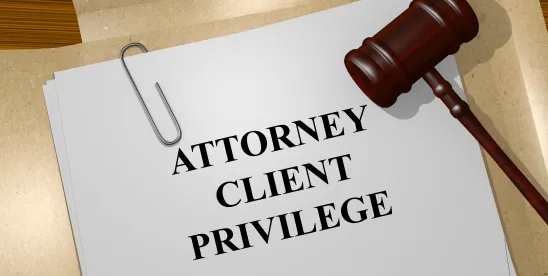Businesses who employ in-house attorneys frequently assume that copying their lawyer on internal communications shields the communications from discovery because of the attorney-client privilege. In 1981, the U.S. Supreme Court articulated the rule that the attorney-client privilege protects communications (a) between attorneys and clients (b) that are maintained in confidence and (c) that were made for the purpose of obtaining or providing legal advice (see Upjohn Co. v. United States, 449 U.S. 383, 389 (1981)). The Upjohn court made it clear that the privilege applies not only to the lawyer’s communications that convey legal advice, but also to the client’s “giving of information to the lawyer to enable [the lawyer] to give sound and informed advice.” Based on this rule, confidential communications between a lawyer and client may NOT be protected by the attorney-client privilege if the communication is NOT made for the purpose of obtaining or providing legal advice.
A recent order from the United States District Court for the Western District of Washington at Seattle illustrates this point and underscores the limits of the attorney-client privilege in protecting communications between in-house counsel and business people about matters that go beyond legal advice. In Garner v. Amazon.com, 2:21-cv-00750-RSL (W.D. Wash. Sept. 23, 2024), a class action alleging that Amazon recorded private conversations through Alexa devices without consent, Amazon attempted to “claw back” over 1,000 documents that it claimed were protected by the attorney-client privilege and inadvertently produced. In response to Amazon’s claw back, the plaintiffs requested an in camera hearing with the court to review the documents. Following the hearing, the court ordered Amazon to produce all or significant portions of approximately 80% of the documents it attempted to claw back.
In determining where the attorney-client privilege applies, the court distinguished “operational advice” from “legal advice” as follows:
…a document whose overwhelming purpose is to seek operational, business, or strategic advice from non-legal professionals (or to summarize operational, business, or strategic issues facing the corporation) cannot be shielded from discovery simply by sharing it with an attorney with an open-ended invitation to chime in if he or she saw anything of interest. To hold otherwise would effectively cloak with the privilege any operational document shared with an attorney.
Based on this analysis, adding a lawyer to an internal email communication about business, operational or strategic issues would not establish attorney-client privilege protection, even if the lawyer is invited to comment with his or her advice. Indeed, the court explained “if the withheld document was reviewed, edited, or commented on by an attorney but reveals only business advice or publicly available information, the privilege does not apply.”
The court allowed Amazon to redact portions of documents where in-house counsel was in fact providing legal advice. According to the court, “[r]edactions will be permitted, but they must be limited to text that reveals the nature of a request for legal advice or the advice provided.” To support such a redaction, the court advised Amazon that it must “make a clear showing that a primary purpose of the communication was to request or provide legal advice.”
While this case involves a consumer protection class action complaint, the analysis behind the rulings could apply just as well to owners, contractors and engineers involved on a construction project. Consider these two statements that might be made in an email communication to the estimating team by a general contractor’s in-house attorney: (1) “under applicable law, a no damage for delay clause is enforceable, with only limited exceptions”; (2) “because the contract contains a no damage for delay clause, we should add extra contingency to our bid.” The Garner court likely would find that the first statement is protected by the attorney-client privilege, but the second statement is a much closer call. It is possible that the court might conclude that the second statement offers “business” or “operational” advice that is discoverable.
Similarly, lawyers should choose their words carefully. The preface to a piece of advice might color a court’s decision about whether the advice is privileged. For example, if the advice follows a statement like “this advice is based on my legal review of the contract,” a court may be more inclined to find that the attorney-client privilege applies. On the other hand, the same advice might be viewed as “business” or “operational” advice if the in-house lawyer couches the advice as “the best way to cut our losses” or “the best strategy to exert our leverage during the negotiations.” To be clear, widespread labeling of documents as “privileged and confidential” likely does not help establish attorney-client privilege. Indeed, the Garner court called out Amazon for seemingly having “a policy of marking documents as ‘privileged and confidential’ because they touch on sensitive subjects, such as consumer privacy, not because they request or reflect legal advice.” Nonetheless, subtle choices about how to present advice to a client might be instrumental in establishing that the advice is protected “legal” advice.
While the Garner court’s narrow view of the attorney-client privilege may differ from the broad protection that many non-lawyer clients expect whenever they “copy their lawyer” on their internal communications, the Garner decision reflects the kinds of rulings that judges often make following in camera reviews of allegedly privileged documents. Clients almost always believe that the attorney-client privilege is much broader than it really is, and it is important for lawyers to remind their clients regularly that adding the lawyer as a “cc” does not automatically protect their communications from discovery. Likewise, lawyers should be intentional about recognizing when they are providing “legal” advice and when they are providing “business” advice, and any “business” advice should be offered with the expectation that it might be discoverable.




 />i
/>i

